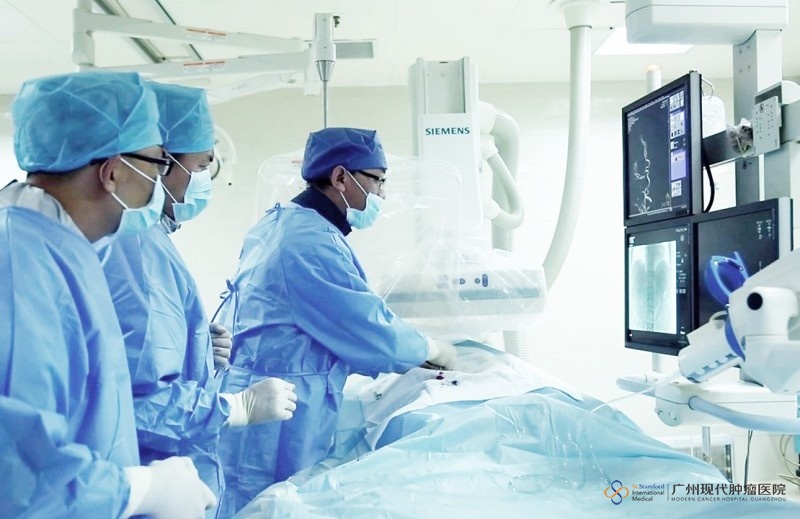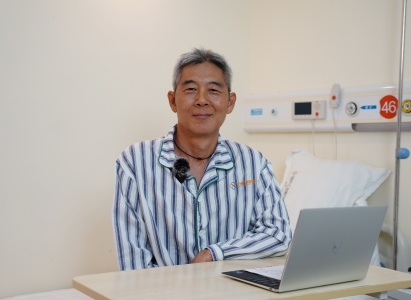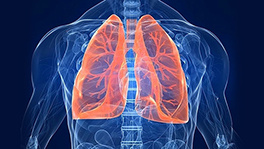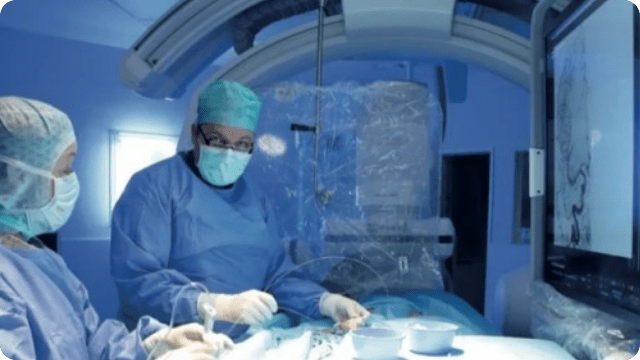 Views:120
Views:120 2024-11-20
2024-11-20 Share
Share
Interventional Therapy
Applicable diseases:
Mainly used in liver cancer, lung cancer, breast cancer, colorectal cancer, cervical cancer, nasopharyngeal cancer, thyroid cancer, prostate cancer, gastric cancer and other solid tumors.Technology advantages:
Small trauma, precise drug delivery, safe without side effects, fast recovery
What is Interventional Therapy?
The classification of interventional therapy includes vascular interventional therapy and nonvascular interventional therapy. Interventional therapy is a mini-invasive therapy performed under the guidance of medical imaging equipments.
With a 1-2 millimeter incision, paracentesis can be performed with the lead of medical imaging equipment. Then a special tube, catheter or other sophisticated apparatus are introduced to inhibit the growth and spread of cancer cells, so as to cut off the tumor’s blood supply and reach the effect of local chemotherapy without any toxic side effects of chemotherapy.

Interventional Therapy VS Systemic Chemotherapy
1. Safety
*Interventional Therapy: High safety
*Systemic Chemotherapy: High risk
2. Damage Degree
*Interventional Therapy: 2 mm small incision; local administration of drug; few toxic side effects and complications.
*Systemic Chemotherapy: Great toxic side effects, such as decline in leukocyte and blood platelet, hair losing, vomiting, decrease of immune function, etc.
3. Drug Concentration
*Interventional Therapy: Drugs are directly given to the tumor via arterial infusion, thus, the drug concentration of interventional therapy is 2-92 times higher than that of systemic chemotherapy. Interventional therapy kills cancer cells more effectively.
*Systemic Chemotherapy: The drug flows to the whole body with the vein, the concentration of the drug that reaches the tumor locally is low, and the effect of killing the tumor is not ideal
4. Treatment Characteristics
*Interventional Therapy: Cuts off the blood supply to the tumor; precisely kills cancer cells; strong targeted; high drug concentration; few side effects; real-time evaluation of therapeutic effect; significant effect.
*Systemic Chemotherapy: Chemotherapy kills not only cancer cells, but also normal cells. Chemotherapy breaks human immune system, brings great side effects and cannot effectively control the development of advanced cancers.
>>For more knowledge about cancer treatment technology, please click online doctors for consultation.
Three Breakthroughs of Interventional Therapy
1. Cutting off the nutrition supply to the tumor, inhibits the growth of tumor
Medical research showed that the 5 years survival rate of early stage malignant tumors is up to 60%-90%. However, because of the limitation of examinational means, most patients’ tumor has developed into middle or advanced stage when they were diagnosed. When the tumor reaches middle or advanced stage, the cancer cells will quickly metastasize to other organs which have rich blood and nutrition. Therefore, it is suitable for cancer patients to take interventional therapy at this stage, because interventional therapy cuts off the nutrition supply to the tumor and inhibits the growth of cancer cells.
2. Minimally Invasive Therapy is of small trauma and few side effects because drugs are directly given to the tumor
When killing cancer cells, traditional chemotherapy not only hurts normal healthy cells and lower human immunity, but also brings great toxic side effects, such as decline in leukocyte and blood platelet, hair losing, vomiting, decrease of human immunity, etc. Middle or advanced stage cancer patients are too weak to undergo such a tortuous treatment. However, interventional therapy only brings 2 mm incision, and the drugs are directly given to the tumor. Therefore, the drug concentration of interventional therapy is 2-8times higher than that of systemic chemotherapy, and interventional therapy is of few toxic side effects and complications.
3. Killing cancer cells precisely, and lowers the risk of metastasis.
Metastasis is a major characteristic to identify cancer from other diseases, and it is the major reason that causes death. The rich blood vessels inside the tumor greatly increase the risk of metastasis. Generally, about 70% of cancer patients have cancer cells metastasis.
6 Advantages of Interventional Therapy
1. Strong Targeting
Drugs are directly given to the tumor to cut off the blood supply and starve the cancer cells to death, so as to protect the normal tissues from the drugs.
2. Small Trauma, Quick Recovery
No operation. With a 2 mm incision, patients can restore to health quickly.
3. Few Side Effects
Interventional therapy overcomes the disadvantages and deficiencies of traditional chemotherapy. Drugs reach to the tumor are of high concentration, which bring few side effects and reduce patients’ suffering.
4. Significant Effect
Patient’s survival time can be prolonged and live quality can be improved after taking interventional therapy.
5. High Repeatability
Interventional therapy can be taken repeatedly because it is not restricted by the metabolism of cancer cell.
6. Local Anaesthesia
Interventional therapy usually adopts local anaesthesia, which avoids the limitation and risk of general anesthesia.
Targeted Users and Diseases
1. All stage cancer patients
2. Patients who do not want or are not suitable to take operation, radiotherapy and chemotherapy.
3. Patients cannot undergo operation again due to the recurrence of tumor
4. Patients who got poor efficacy after taking traditional operation, chemotherapy and radiotherapy.
5. Patients suffer from resistance or adverse reactions of radiotherapy and chemotherapy
6. Interventional therapy is suitable for patients with liver cancer, lung cancer, breast cancer, colorectal cancer, cervical cancer, nasopharyngeal cancer, thyroid cancer, prostate cancer, stomach cancer or other cancers.
The Advantages of Modern Cancer Hospital Guangzhou
1. Oncologists with rich clinical experiences
In order to make sure the accuracy of drugs and embolization agents to the tumor, doctors perform interventional therapy must possess the following three skills:
(1) Skillful puncture technique, so as to make sure the accuracy of puncture
(2) Professional knowledge about vascular anatomy, so as to find blood vessels precisely and quickly
(3) Solid foundation of iconography knowledge
The above three skills are indispensable. Doctors with rich clinical experiences in Modern Cancer Hospital Guangzhou are required to equip with these three skills, so as to make sure the success of interventional therapy.
2. Effective anticancer drugs
The interventional therapy in Modern Cancer Hospital Guangzhou adopts effective anticancer drugs, the Chinese herbal medicine ingredient in the drug has the effect of preventing the formation of tumor blood vessels, so as to inhibit the growth of tumor and treat it. Interventional therapy has the advantages of strong targeted, no drug resistance, few toxic side effects, etc.
 Prostate cancer
Prostate cancer- Mr.Chen
- Malaysiamore than 1 year
Mr.Chen was diagnosed prostate cancer, the local doctor suggested him to undergo a direct resection, but Mr.TING wanted to live a life like normal peop...


 (MY)+60 10-898 8919
(MY)+60 10-898 8919

























